 The federal government has recently made changes to mortgage rules with the intention of making sure Canadian home buyers don't take on mortgages they can't afford. These additions also aim to fix issues associated with international home buyers who buy and resell Canadian properties. Take a look below for a summary of these changes, and what they could mean for you.
The federal government has recently made changes to mortgage rules with the intention of making sure Canadian home buyers don't take on mortgages they can't afford. These additions also aim to fix issues associated with international home buyers who buy and resell Canadian properties. Take a look below for a summary of these changes, and what they could mean for you.
1. Expansion of the Mortgage Rate Stress Test
Beginning October 17th, a stress test will be applied to all brand-new mortgages. This provision has been put in place to determine if a home buyer could still afford their mortgage in the event of rising interest rates.
How It Works
The property buyer will need to meet the criteria for a mortgage not only at the agreed-upon rate but at the Canadian Bank's preset five-year mortgage rate as well, which averages out the rates of Canada's six major banks. This figure, which was posted at 4.64% on September 28th, will be used to see if you can afford the higher interest rate should it ever change unexpectedly.
Other aspects of this provision state property buyers can spend a maximum of 39% of their income on house maintenance expenses such as mortgage bills, utilities, and property taxes. Another clause state a home owner's "total debt service ratio" cannot go beyond 44%.
Who Is Affected
These trial provisions impact all new home buyers and loan companies wanting to buy government-supported insurance plans for low-rate home loans.
Why
Canadian authorities are reacting to worries that high increases in home prices in premium urban areas such as Vancouver and Toronto might raise the chances of foreclosures later on if interest rates increase as well.

2. Limitations for Low Ratio Loans
Beginning on November 30th, the Canadian government will put new limitations on its insurance coverage for low-ratio home loans.
How It Works
The new law limits insurance coverage for low-rate mortgages by applying new conditions such as the mortgage repayment phase can't exceed 25 years, the buying price must be under $1,000,000, the purchaser must have a credit rating of at least 600, and the home must be occupied by the rightful owner.
Who Is Affected
This provision is aimed at decreasing the government's involvement with home mortgages on real estate valued at $1,000,000 or more. This is mostly because this property type has risen dramatically in the past few years in both Toronto and Vancouver.
Why
Among all governmental insurance markets, Toronto and Vancouver are the two most important housing sectors. These provisions are directed more towards those areas in the hopes of levelling the playing field for all home buyers, both domestic and international.
3. Primary Residence Disclosure
This change establishes new disclosure rules for selling primary residences.
How It Works
Previously, all money earned by selling a primary home were untaxed and didn't need to be disclosed as income. Starting this tax season, the tax for capital income may still be waived, but the selling of the primary home has to be disclosed to the Canadian Revenue Agency.
Who Is Affected
While everybody who places their primary home on the market is now required to disclose the details, the change is intended to prevent overseas purchasers who flip properties from receiving a primary home tax break they aren't eligible for.
Why
There has been considerable evidence revealing international investors are reselling Canadian properties and making fraudulent claims for primary home tax breaks.
4. Sharing the Risk
The Canadian government is releasing consultation papers for lessening loan provider risks.
How It Works
At present, the government is being pressured to shoulder the entire cost of a home mortgage in case owners default on their payments. The government now plans to publish an open consultation paper to have banks take on a portion of that financial risk. The Canada Finance Department admits this will be a major change to the structure of the Canadian mortgage system.
Who Is Affected
Mortgage providers (including banks) will need to assume additional risk. This could result in increased home loan rates for property buyers.
Why
The Canadian government is trying to decrease its financial debts in case of nationwide home loan defaults, as well as trying to promote smart financing operations.
Property is an asset that increases in value over time, and you'll have to pay expenses whether you buy or rent. These four major changes can actually help you to plan your purchases more wisely and positively impact your credit score; boosting your purchasing power on a valuable asset at a reduced interest rate. For further information, read the Government of Canada's official announcement.
Photo credit: house graph, mortgage illustration





